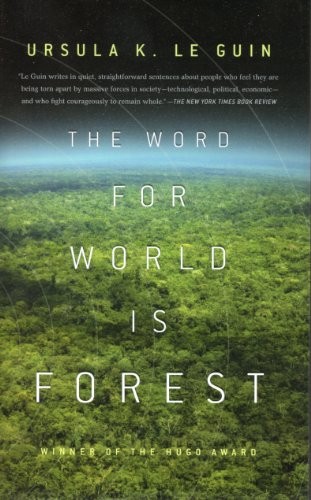La Le Guin minore è comunque materiale olimpico
5 stars
[Prima recensione composta direttamente su Bookwyrm, yay!]
Conoscevo già il Ciclo Hainita di Ursula Le Guin per aver già letto The Left Hand of Darkness, che avevo apprezzato ma non del tutto colto, e The Dispossessed: An Ambiguous Utopia, che avevo adorato perché toccava tutti i tasti giusti al momento giusto. Ho voluto completare la tripletta dei romanzi centrali della serie, ergo ho recuperato pure The Word for World is Forest, già sapendo che trattandosi di una novella, non di un romanzo, ha un respiro e una complessità minore – ma trovo sia proprio questa la sua forza. Nella prefazione, Le Guin è molto franca: si rende perfettamente conto che l'opera nasceva come romanzo di denuncia "a tesi" nel pieno delle proteste contro la Guerra del Vietnam, e che proprio per questo raggiunge dei picchi taglienti di polemica e di "omelia" propagandistica, e i caratteri dei personaggi …
[Prima recensione composta direttamente su Bookwyrm, yay!]
Conoscevo già il Ciclo Hainita di Ursula Le Guin per aver già letto The Left Hand of Darkness, che avevo apprezzato ma non del tutto colto, e The Dispossessed: An Ambiguous Utopia, che avevo adorato perché toccava tutti i tasti giusti al momento giusto. Ho voluto completare la tripletta dei romanzi centrali della serie, ergo ho recuperato pure The Word for World is Forest, già sapendo che trattandosi di una novella, non di un romanzo, ha un respiro e una complessità minore – ma trovo sia proprio questa la sua forza. Nella prefazione, Le Guin è molto franca: si rende perfettamente conto che l'opera nasceva come romanzo di denuncia "a tesi" nel pieno delle proteste contro la Guerra del Vietnam, e che proprio per questo raggiunge dei picchi taglienti di polemica e di "omelia" propagandistica, e i caratteri dei personaggi sono monodimensionali rispetto ad altre sue opere... ma tutto ciò, secondo me, funziona benissimo lo stesso, perché il romanzo schierato è necessario, davanti a certi temi, e il tema qui è che in certe situazioni di violenza esistono inconfutabilmente una parte aggressora che agisce in malafede, e una parte offesa che ha diritto all'autodifesa: per citare Italo Calvino (uno che la guerra di Resistenza l'ha fatta e che Le Guin ammirava molto), è giustissimo che tutto il bene lo abbiano in cuore gli indigeni arboricoli di Athshe, il pianeta il cui nome vuol dire "foresta", mentre tutto il male stia nei soldati della spedizione coloniale terrestre, venuti a predare e saccheggiare e massacrare – perché nel futuro di Le Guin la mentalità fascista e capitalista non è venuta meno per un cavolo, e il napalm irrora le forestre extraterrestri come già aveva irrorato l'Indocina e la Palestina, ma se l'indigeno osa alzare un dito contro il colonizzatore predatore allora apriti cielo. In ogni caso, al di là della "facile" metafora bellica da riapplicare alla nostra situazione sulla Terra, questa "novella" minore si difende bene anche nella speculazione sociologica, che è la grande cifra della nostra autrice: la cultura delle comunità athsheane ha una tangibilità clamorosa, dall'architettura dei villaggi alla ripartizione dei ruoli sociali fra donne e uomini ("Agli uomini il lavoro intellettuale, alle donne quello politico, all'interazione fra loro l'etica"), fino alla splendida contrapposizione tematica fra la capacità degli athsheani di vivere veglia e sonno come un continuum e costruire di conseguenza la propria cosmologia, in contrasto con le tossicodipendenze varie ed eventuali dei Terrestri – e non è un caso che l'eroe della resistenza indigena, Selver, sia appunto uno sciamano addestrato a vivere nelle profondità del sogno, che usa le sue capacità per accogliere nella propria cultura il bene e il male portato dai Terrestri, mentre il capitano Davidson, l'antagonista che Le Guin, pur non volendo, ha dipinto come intrinsecamente malvagio, sia tale in quanto militare razzista, misogino, scientista, tossicomane e intellettualmente intrappolato in un circolo vizioso egoriferito, tale per cui la sua percezione delle cose salta di palo in frasca così da dargli sempre ragione a prescindere – letteralmente, l'archetipo (non lo stereotipo, l'archetipo) della peggiore merda che ha prodotto l'Occidente. Un romanzo breve violento e amaro, ma anche fonte di speranza. Un romanzo da leggere ora che l'Occidente sta ritornando apertamente fascista, e solo i popoli indigeni in rivolta hanno la superiorità morale per tentare di scrivere una diversa storia.






